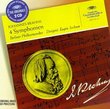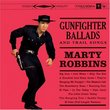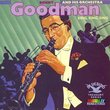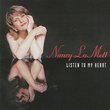| All Artists: Giuseppe Verdi, Claudio Abbado, Alla Scala Theater Orchestra & Chorus, Piero Cappuccilli, Shirley Verrett, Plácido Domingo, Alfredo Mariotti, Antonio Savastano, Carlo Zardo, Maria Fausta Gallamini Title: Verdi: Macbeth Members Wishing: 0 Total Copies: 0 Label: Deutsche Grammophon Release Date: 1/28/1997 Genre: Classical Style: Opera & Classical Vocal Number of Discs: 2 SwapaCD Credits: 2 UPC: 028944973228 |
Search - Giuseppe Verdi, Claudio Abbado, Alla Scala Theater Orchestra & Chorus :: Verdi: Macbeth
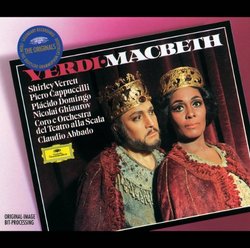 | Giuseppe Verdi, Claudio Abbado, Alla Scala Theater Orchestra & Chorus Verdi: Macbeth Genre: Classical
|
Larger Image |
CD DetailsSimilar CDsSimilarly Requested CDs
|
CD ReviewsThe ultimate she-devil Julian Grant | London, Beijing, New York | 08/03/1999 (5 out of 5 stars) "There is tough competition for the best recording of 'Macbeth', but for me the combination of Abbado's explosive and rhythmically taut way with the score and Shirley Verrett's tour de force as Lady Macbeth give this one the edge. Verdi famously maintained he wanted a 'she devil' in the role of Lady Macbeth, and it is a role that has been essayed by both sopranos and mezzos, with varying success. Fiorenza Cossotto (in the rival EMI Muti version) has more idiomatic Italian and forward projection, but sounds generalized and rantingly melodramatic besides this much subtler performance. The variety of tone colours Verrett produces is awesome - the duet with Macbeth (a more than usually involved Piero Cappuccilli) is a locus classicus of opera as theatre. She has the heft and volume when needed (I don't understand the gramophone critic's reservation about Verrett's top notes - they ring out thrillingly) and yet produces an extraordinary performance of the Sleepwalking scene that once heard, haunts the memory - complete with perfectly placed pianissimo top Db. Cappuccilli sings with burnished tone and is suitably histrionic in the Banqueting scene, though not as alert to nuance as Giuseppe Taddei on the Schippers set (alas not recommendable, despite a strong performance from Birgit Nilsson, as it is a Schippers edition with perfectly idiotic cuts, snipping away at some of Verdi's revised moments.) No this is the one to have, Domingo and Ghiaurov give strong support, Abbado's way with the music, from the rum-ti-tum witches and the ballet to the Lady Macbeth scenas and pre-murder duet with Macbeth, the dark heart of this uneven but fascinating score, is fervent and Toscanini-like in its precision, and above all Verrett's mesmerizing performance give this one the palm. It's a classic of the gramophone, buy it, a bargain at mid-price." A great Macbeth Jay Dickson | Portland, OR | 01/03/2002 (5 out of 5 stars) "Despite its unevenness of sophistication, in that it sometimes lurches back and forth between naive barrelthumping choruses (a la IL TROVATORE) and highly nuanced and thoughtful character studies (a la OTELLO), MACBETH may remain my alltime favorite Verdi opera, in that this change of tone is so perfectly suited to the material. Verdi was really trying something new here, and the excitement of his ability to set Shakespeare to music (and perhaps add a different dimension to it) shows throughout . Abbado's recording here is considered one of the best, and justly so: the conducting is very fine and crisp, and the production is genuinely exciting.Just as all versions of the play rise and fall on their leads, so too do all versions of the opera depend on theirs, and there are few finer Macbeths and Lady macbeths than you'll find here. Shirley Verrett may have been one of the greatest of all Lady Macbeths, and she's spectacular here: she's not only terrifying in her Letter Aria but just as equally convincingly attractive (if sternly powerful) in the Brindisi. The sleepwalking scene is perhaps the finest aria Verdi ever wrote, and is in and of itself a miniature lesson in the power of what opera can do to extend pity and terror in drama (just listen to that chillingly accusative English horn rising at the end of each measure!), and here Verrett does not disappoint. Although many other of the best Lady Macbeths, such as Leonie Rysanek and Maria Callas, *act* the scene out more dramatically--gasping, for example, on the second syllable of the last "immaginar"--, Verrett achieves her effects in a different manner, almost entirely by her choice of dynamics. She may be more controlled, but every bit as memorable." Cappucilli and Verrett Astound Jay Dickson | 08/05/1999 (5 out of 5 stars) "I am thrilled with this recording. It is true that the duet between Cappucilli and Verret is amazing, it transports you right to the castle adn you can taste the varrying emotions in Cappucilli's voice. Verrett is a scarry Lady Macbeth, I feel genuinely intimidated by her throughout the recording. I do feel that her high note aren't quite as full as I would like to hear them, but maybe their shrilness is appropriate. Of all the Macbeth's currently available this is my recommendation. I would like very much to purchase the recording with Nilsson but I am unable to find it. Anyone have any clue on that one? Anyway if you're looking for the best one available, get this one."
|

 Track Listings (15) - Disc #1
Track Listings (15) - Disc #1
